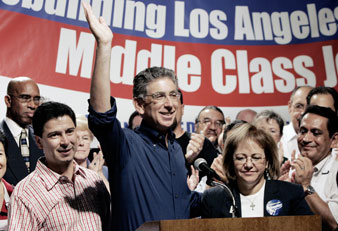 AP ImagesPhil Angelides, center, waves during a speech before the Los Angeles County Federation of Labor AFL-CIO, Sept. 4, 2006.
AP ImagesPhil Angelides, center, waves during a speech before the Los Angeles County Federation of Labor AFL-CIO, Sept. 4, 2006.
Phil Angelides, the former state treasurer of California, is a tough-minded liberal with hands-on knowledge of high finance and the social contradictions in modern capitalism. So it is remarkable that Angelides has been chosen to chair the Financial Crisis Inquiry Commission newly created by Congress. The commission has enormous potential to generate deeper reforms than anything President Obama has yet proposed, simply by digging out the hard facts of what caused the financial collapse.
An honest investigation–like the Pecora hearings that famously revealed the truth of what caused the Great Depression–could splash embarrassment on both political parties and turn up shocking evidence of the political collusion between Washington and Wall Street. But can we really expect such a truth-telling creature to emerge from Congress? Maybe we can. The appointment of Angelides is a very promising start because of his record as an aggressive reformer on issues like corporate governance, social equity and environmental reform. The danger is that the Angelides commission will be paralyzed by the usual hard-nosed tactics of Washington partisans.
Angelides was named by Democratic Congressional leaders, but Republicans picked four of the ten commission members and chose a relentless partisan as the vice chair–former Representative Bill Thomas. Thomas was Ways and Means chairman in the Bush years, well-known for his intellectual brilliance and his take-no-prisoners legislative tactics. Angelides must get Thomas’s consent on staff appointments, particularly the crucial job of chief investigator. Issuing subpoenas will require support from at least one of the Republicans. “I talked with Bill Thomas,” Angelides said. “His view is our job is tell the truth. Let’s surprise people.”
Angelides is hopeful the commission will surprise skeptics–if it sticks to the task of digging out the facts. “Given the extent of harm that has been done to so many people and the damage done to our system, my hope is that people will rise to the occasion and do the right thing,” he told me. “Probably, there’s a lot of nervousness out there as to what rocks might be turned over, because there will be Democrats who will be nervous about those facts too. We have to dig deep and get to the root causes, and we have to do this in a way that’s understandable.”
The best evidence of Angelides’s authentic values is that, as state treasurer, he was endlessly attacked and ridiculed by the Wall Street Journal. Angelides was a pioneer among state treasurers in mobilizing the financial-market power of CalPERS and CalSTRS, California’s mammoth pension funds for public employees and teachers. Those funds repeatedly used their weight to challenge Wall Street firms and corporate managements on the soundness of investment strategies and the financial system’s disregard for larger social consequences, including ecological destruction. He ran for governor and lost in 2006, then returned to his private life as a real estate developer (a joint venture with Magic Johnson to build affordable rental housing in Los Angeles) while also serving actively as chairman of the Apollo Alliance for a green economy.
During the Bush years, when Angelides articulated his views on capitalism, he sounded downright quaint. In a Nation article I did four years ago on pension-fund power, Angelides explained his perspective: “I would make the case–this comes from my experience in real estate–that the best, most highly regarded companies are the ones that are profitable and also produce products that are of utility to society, that increase our productivity and enrich our lives. When people step back and ask what they most want to see in the private sector, it is both profitability and good results for society. There is no reason capital shouldn’t be held to the same standard.”
If Phil Angelides applies that standard to his commission’s inquiry, we will see one bombshell after another.


